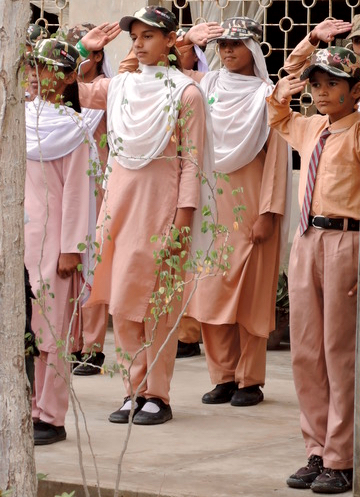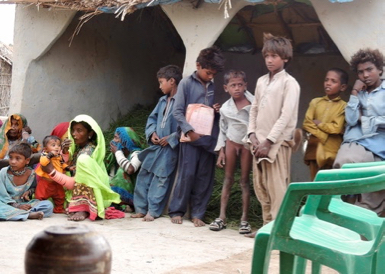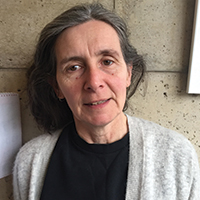By Henrietta Cullinan
This summer I joined ‘Invitation to Mission’, a project run by the Columban Missionaries that sends groups of lay people to visit Christian communities abroad, in my case the Columban Fathers Mission Unit in Sindh province, south east Pakistan.
For several days we stayed in the small town of Badin, about five hours drive east of Karachi, in the Columban church compound, where there is a church, a school, a TB clinic, and accommodation for the two priests, the catechists, the headmaster and their families. Behind the compound is a narrow street of shops, selling fabric, clothes, and cosmetics. Pedestrians weave in and out of, rickshaws and, motorbikes , hopping over the sewers and rubbish.
Early each morning the heavy metal gate clangs and small feet scuffle past my window, as children from Christian, Muslim and Hindu families, dressed in neat beige uniforms, arrive for school.
The curriculum includes at least five languages: Urdu, English, Arabic, Parkari, and Sindhi.
Our host in Badin, Fr Daniel O’Connor, took on the task of exposing us to the daily reality of missionary life, to the complexity of culture and faith in Pakistan.
Through celebration of the Mass, we met roadsweepers, tribal people, farmers, local activists. The Mass provided the context in which we encountered men and women whose lives are far removed from our own and gained an small insight into the implications of being a religious minority.
The first mass we attended, I started to pick up the local customs and influences, called "inculturation". As a woman I needed cover my head with my "dupatta", or shawl-like scarf, and join the women and small children on one side of the church. I sat cross-legged on the plastic straw matting, choosing a cool place under a fan, and avoiding the patches of sun.
The parish sister showed me the prayer book that one of their congregation had translated into Parkari, a minority language and the language of Mass that day.
Father Daniel wore a length of saffron muslin round his neck. He sat on a low chair behind a low box for the altar. After the Gospel, the children carried around the candle, the incense and lectionary open at the scripture reading.
We bowed and laid our hands over each object.
After communion another child passed round a bowl of sweets and biscuits.
Afterwards we learned that all these parts of the rite are due to local influences, originating in Hinduism, where, saffron, rather than liturgical green, is the colour of holiness.
Later that same weekend, we set out for Mass in Tajelie, a small village on the road to Kadaan, where there is a Christian community of the Parkori Koli tribe.
After being forced to give up a nomadic way of life, the Parkori Koli became bonded agricultural labourers, often trapped in a cycle of debt to their powerful landlords.
We climbed into the mission’s Toyota pick-up, converted into an ambulance.
Fr Daniel brought a large knapsack stuffed with equipment for the Mass, torches and picture books. Among the passengers was an elderly man, just discharged from hospital and one of the catechists, who brought the harmonium and his children, in their very best clothes.
It felt like a pilgrimage, as we turned off the main road, past the Army Sugar Factory, onto a high narrow dyke, that winds in large right angles around the paddy fields, between the overgrown thorn bushes, whose thorns, we learned, were tough enough to puncture a car tyre.
 The space for the Mass was marked out by traditional Sindhi appliquéd quilts laid on the ground and lit by a torch tucked into the roof of the verandah. On the altar was a small oil lamp with a glass shade against the incessant wind.
The space for the Mass was marked out by traditional Sindhi appliquéd quilts laid on the ground and lit by a torch tucked into the roof of the verandah. On the altar was a small oil lamp with a glass shade against the incessant wind.
Sticks of incense in a jar were placed in front of an illustrated missal, held open with a ruler. The children sat pressed together at the front. The women sat behind, each one covered in a long dupatta with fluorescent lace edging and her arms covered in bangles over the elbow. Well out of the light stood the men and beyond that the animals, the stars, the night, the waving thorn branches.
With my eyes unaccustomed to the darkness, I was aware of constant movement of small creatures, a kitten with a skimpy vertical tail, a guard dog, a frog. During the sermon, Fr Daniel held up the Gospel picture while the catechist talked, and during the creed, a series of diagrams, representing the Holy Spirit, or the Virgin.
When it was time to go back to the car, we walked swiftly, surrounded by villagers armed with sticks, to ward off the pack of village dogs. We stepped out onto the lane and were met by the grand chorus of cicadas and the frogs, singing and hooting in the paddy fields.
The next evening, we drove to Talhar, a small town where there is a Christian community of road sweepers. This time the parish sisters, Maryam and Arzu, joined us in the Toyota ambulance. It was so hot in the church, with no electricity to run the fans. I sat outside, and two women came to sit next to me.
In Pakistan it’s not done to be left by yourself. It being around Independence Day, there was shouting and the sound of motorcycles revving outside in the street, men shouting, "Allahu Akbar". The sisters said perhaps it was because they knew that Mass was happening, perhaps not.
Most road sweepers are Christian, and later in in our trip we met an activist lawyer who is trying to improve their working conditions. The occupation carries a lot of stigma and we are told of cases brought against road sweepers under the country’s cruel blasphemy laws. One member of the congregation has told Fr. Daniel that she tries to hide her occupation, saying she works for the council. After Mass she invited us for tea in her house, where we met her daughters. One was ambitious and said she hoped to finish school and train to be a teacher.
In the house, a narrow plot walled in on three sides, there were a couple of goats tied up in the yard. We learned that many families were fattening up an animal to sell for Eid al Adha. On the way out I noticed the father of the family had his foot on the neck of the guard dog, to keep it from attacking us. In spite of the hospitality and the friendly welcomes, it was impossible not to notice an under current of violence. The church compound in Badin was guarded by an armed night watchman and a policeman.
 The village in Kadaan had a perimeter fence of thorn bushes and a pack of fierce dogs trained to attack intruders.
The village in Kadaan had a perimeter fence of thorn bushes and a pack of fierce dogs trained to attack intruders.
Late at night or after a meal, the missionaries couldn’t help but share alarming stories of kidnappings and violent thefts. The catechist, on trips to outlying villages, risked having his motorcycle hijacked from under him, and so takes his wife for protection. As a westerner I was keenly aware of the militarism of Pakistan that finds its way, through the Independence Day celebrations, into Mass, into school, with children dressed up as soldiers and national flags draped behind the altar.
I found myself asking what it takes to build a Christian identity. In the tribal village the presence of the Eucharist seemed fragile, not because there was no building or because of the Hindu cultural influences on the rite, but mainly because the practice of our faith relies so much on education, on the ability to decode text, images and symbols. The Bible has been translated into Parkari, but the school in Tajelie had been burnt down.
Lack of education means not many people can read the Gospel, even in their own language. The Gospel for that Sunday was Jesus walking on water. The catechist preached: "Do not be afraid, even if you are a minority, or suffer ill health, or have money worries." Fr Daniel said we must be ready for a "hang loose" theology in Pakistan.
In Tajelie, I came to a new understanding of the Mass, of the real elements that should always be included in the celebration but which are often just symbolic: the process of claiming the space, physically, for worship, and with the frog that hopped past my feet, the wind tossing the thorn bushes, the eco system of the Indus flood plain, our place in Creation.
Henrietta Cullinan is a peace activist and writer, and member of the London Catholic Worker. She has travelled to Kabul, Afghanistan, twice, as a member of a peace delegation with Voices for Creative Nonviolence UK. Follow her on Twitter @Henrietta_


 Loading ...
Loading ...
What do you think?
You can post as a subscriber user ...
User comments (0)